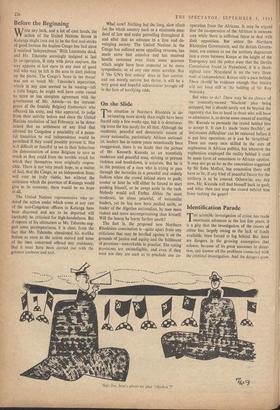Before the Beginning
WITH any luck, and a lot of cool heads, the action of the United Nations forces in Katanga might turn out to be the first real stroke of good fortune the hapless Congo has had since it received 'independence.' With Lumumba dead, and Mr. Tshombe seemingly resigned at last to co-operation, if only with force majeure, the way appears at last open to any men of good will who may be left in the area to start picking up the pieces. The Congo's 'bone in the throat' was not so much Mr. Tshombc's separatism, which in any case seemed to be waning--left a little longer, he might well have come round to more or less complete agreement with the government of Mr. Adoula—as the intransi- gence of the (mainly Belgian) freebooters who officered his army, and who appeared, to judge from their activity before and since the United Nations resolution of last February, to be deter- mined that no settlement of any kind that allowed the Congolese a possibility of a peace- ful transition to real independence would be permitted if they could possibly prevent it. Nor is it difficult or fanciful to see in their behaviour the determination of some Belgians to save as much as they could from the terrible wreck for which they themselves were originally respon- sible. There is not very much hope, as a matter of fact, that the Congo, as an independent State, will ever be truly viable; but without the assistance which the province of Katanga would give to its economy, there would be no hope at all.
The United Nations representative who or- dered the action under which some at any rate of the non-Congolese officers in Katanga have been disarmed and are to be deported will inevitably be criticised for high-handedness. But if reports of his ultimatum to Mr. Tshombe sug- gest some peremptoriness, it is clear, from the fact that Mr. Tshombe abandoned his warlike threats as soon as the action started and none of the men concerned offered any resistance, that it must haVe been carried out with the .greatest coolness and tact. What now? Nothing but the lone, slow climb for the whole country back to a minimum stan- dard of law and order prevailing throughout it, and after that an advance to a free and de- veloping society. The United Nations in the Congo has suffered some appalling reverses, has made some bad mistakes and has received hostile comment even from some quarters which might have been expected to be more sympathetic, or at any rate more sensible. But if 'the UN's first colony' does in fact survive and not merely survive but thrive, it will be a very great and hopeful achievement brought oft in the face of terrifying odds.


































 Previous page
Previous page